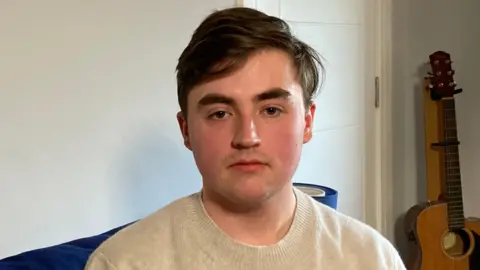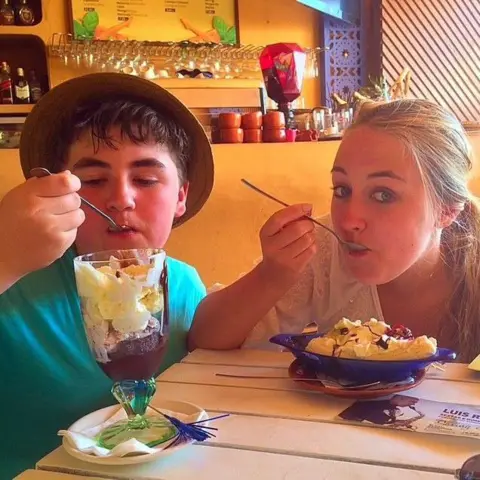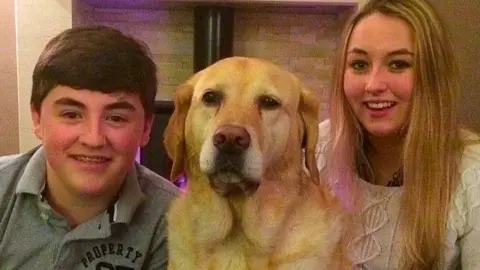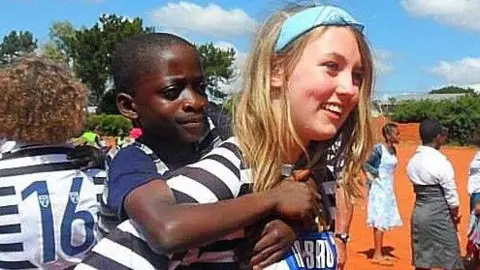'My sister was killed by the justice system'
The brother of a young woman who took her own life while in a young offenders prison says the justice system killed her.
Katie Allan was 21 when she was found dead in her cell at Polmont Young Offenders Institution in June 2018, three months into a 16-month sentence for dangerous and drink driving.
Her brother Scott, now the same age as his sister when she died, told BBC Scotland she was vulnerable, abandoned and "destroyed" by a system meant to be keeping her safe.
Following a fatal accident inquiry (FAI), a sheriff has now ruled a "catalogue of failures" within the system led to Katie's death.
In his determination into Katie's death and that of fellow Polmont inmate William Brown, 16, Sheriff Simon Collins KC also found reasonable precautions could have been taken to avoid them taking their own lives.
The results of a separate inquiry into 20-year-old Jack McKenzie's suicide at Polmont in 2021 will be released at a later date.

The FAI into Katie's death heard she was vulnerable and had a history of self-harming which Polmont prison staff were not aware of.
It also heard she struggled in prison and was being taunted and threatened by other prisoners before her death.
Her mother Linda told the inquiry at Falkirk Sheriff Court her daughter had been left traumatised by the abuse.
She said someone had shouted at her to "go and hang yourself Katie and give us all peace".
Her brother Scott was 15 at the time, but he says that even as a young teenager he could see the flaws in the prison system which led his sister to become "too scared to keep living".
Speaking ahead of the publication of the FAI report, Scott said the prison environment was slowly killing Katie and the authorities "abandoned" her to get on with it.
"They blatantly murdered her," he told BBC Scotland News.
"They tortured her. They defiled her. They destroyed someone and then, when all was said and done, let her have the mercy of death.
"They didn't just kill her, they destroyed her."
The Allan family have always said that Katie admitted her offence and accepted she should be punished.
She apologised and during her sentencing the court heard that the family of the 15-year-old boy she had hit and injured with her car did not want Katie to go to prison.
She was still given a custodial sentence.
"She made a mistake and she paid for it with her life," Scott said.
 Allan family
Allan familyThe FAI heard that Katie struggled in prison.
Her allocated prison officer told the inquiry she was "not built for prison".
Her mother said Katie suffered taunts over hair loss she was experiencing through alopecia and her mental health "significantly deteriorated" while she was in custody.
She said her daughter was "incredibly distressed".
Scott remembers the last time he saw his sister at Polmont.
"My mum and I both said to a prison officer, she needs to be on careful watch tonight, she's very vulnerable.
"I knew that night something was going to happen.
"She was either going to get beat up or she was going to have to be in an isolated cell.
"But I didn't even picture something worse happening."
 Scottish Prison Service
Scottish Prison ServiceHe said at the age of 15, he didn't understand the legal jargon and why his sister was in prison but he understood what he saw happening to her there.
"I was slowly watching someone I treasure lose themselves, slowly become less and less of themselves," he said.
"Visit by visit she'd be a little less comfortable, she'd be a little less adjusted, she'd be more exposed to the environment in a way that was slowly killing her.
"Even if she had survived and gotten out of prison, she wouldn't have been the same person."
 Allan family
Allan familyThe day after that last visit on 3 June, Scott was summoned out of his classroom at school. He remembers it vividly.
"It was during my lunch break," Scott said.
"I got a phone call from my mum and she was like, can you come down to the main bit, please?
"I said okay, 'what's going on?'."
In the school car park, Scott sat in the car while his mum explained what had happened.
Scott said he was "instantaneously broken".
"I'd just lost the most important person in my life."
Scott found it hard to come to terms with losing his sister.
"I was angry the whole time," he said.
"I was a child, and I could see the flaws of the prison system.
"How can they not understand the flaws when a child can see it?
"The lack of empathy. And it was more and more evident, not just from my sister, but the stories she told me about other prisoners when in Polmont.
"They're absolutely abandoned to get on with it."
 Allan family
Allan family'Deep grief and panic attacks'
Scott describes his loss as losing multiple loved ones.
"Katie was almost three people," he said.
"She was my best friend, my big sister and almost like another mother to me.
"She was very, very close to me. I was very close to her. I could always be very honest with her.
"She always helped me get out of my shell."
Almost seven years later, Scott feels his life is only just moving on after his teenage years were hit by grief.
He said he went to university in Edinburgh to "get away from it all" and make a fresh start but grief got in the way of making new friends and meeting people.
He saw alcohol as the enemy for a long time as a result of its role in his sister's conviction.
He was also "closeted in deep grief" and found it impossible to talk about psychological or philosophical concepts in his degree course because it all brought up memories.
After years of paralysing grief and panic attacks, he says he has had to "learn how to become a person again" but believes now that he is starting to look toward the future.
 Allan family
Allan familyThe purpose of a fatal accident inquiry was to establish what happened and prevent future deaths from taking place in similar circumstances.
In his report, Sheriff Collins has made 25 recommendations, including for the prison service to make definite and practical steps to make cells safer.
The sheriff also criticised the failure for this to happen in the years since Katie and William's deaths.
The Allan family are calling for a change in the law to address Crown immunity - which protects the prison service from prosecution - as well as reform of the FAI process and improvements to legal aid.
Scott hopes that eventually Katie's legacy will be change - which will lend some meaning to her death.
"This won't happen to someone else, or at the very least it'll happen to a lot less people as a result of the work we've done," he said.
But he still misses her every day.
"There's so many memories I have of Katie. I deeply, deeply wish I could make more, but I know I can't."
A Scottish Prison Service spokesperson said: "Our thoughts remain with the families of Katie Allan and William Lindsay.
"We are grateful to Sheriff Collins for his recommendations, which we will now carefully consider before responding further."
If you have been affected by the issues in this story, help and support is available via the BBC Action Line.
